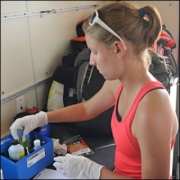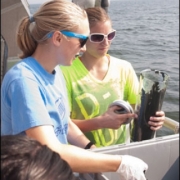Eight students will be presenting the summer work at the Ocean Sciences Meeting in March 2022!
The Maryland Sea Grant bookstore is closed from December 10 to January 3.
Our Students and Their Research

You may search for students by class year and keywords found in the student's name, university, project title or abstract. Our first class was in 1989.

Mentors: Cindy Palinkas, Ph.D.
Location: Horn Point Laboratory
Project: Potential Sediment Exchange between Marshes and Adjacent Submersed Aquatic Vegetation (SAV) Beds

Mentors: Lora Harris, Ph.D.
Location: Chesapeake Biological Laboratory
Project: Modeling Nitrogen Loading for Hall Creek and Parker's Creek Watersheds

Mentors: Elizabeth W. North, Ph.D.
Location: Horn Point Laboratory
Project: The Bailey Project: New Technologies to Support Shellfish Restoration

Mentors: Jeffrey Cornwell, Ph.D.
Location: Horn Point Laboratory
Project: Impact of Oyster Floats on Chesapeake Bay Water Quality

Mentors: Victoria Coles, Ph.D.
Location: Horn Point Laboratory
Project: Quantifying the Propagation of the Amazon River Plume in the Western Tropical North Atlantic

Mentors: Hongsheng Bi, Ph.D.
Location: Chesapeake Biological Laboratory
Project: Spatial and Temporal Distribution of Atlantic Menhaden Brevoortia tyrannus, Larvae in Coastal Atlantic Waters

Mentors: Thomas Miller, Ph.D.
Location: Chesapeake Biological Laboratory
Project: Ecosystem Consequences of Single Species MSY Fishing Policies in the Chesapeake Bay

Mentors: Larry Sanford, Ph.D.
Location: Horn Point Laboratory
Project: Mass Balance Analysis of Oyster Biodeposits

Mentors: Halimeda Kilbourne, Ph.D.
Location: Chesapeake Biological Laboratory
Project: Reconstructing Local Relative Sea Levels Using Current Sea Level and Faunal Zonation in the Peri-Tidal Region of Chesapeake Bay

Mentors: Carys Mitchelmore, Ph.D.
Location: Chesapeake Biological Laboratory
Project: Acute Toxic Effects of Corexit 9500 on Larval Blue Crab, Callinectus sapidus, Life Stage

Mentors: Lora Harris, Ph.D.
Location: Chesapeake Biological Laboratory
Project: Picophytoplankton Biomass and Productivity in the Potomac and Patuxent Rivers

Mentors: Halimeda Kilbourne, Ph.D.
Location: Chesapeake Biological Laboratory
Project: Analysis of Oxygen Isotope Ratios in the Coral Montastraea faveolata to Determine Climate Conditions in the Caribbean

Mentors: Andrew Heyes, Ph.D.
Location: Chesapeake Biological Laboratory
Project: Retention of Various Metals Through Metamorphism in Grey Tree Frog (Hyla versicolor) Larvae Introduced Through Diet

Mentors: Raleigh Hood, Ph.D.
Location: Horn Point Laboratory
Project: Automating the Process of Counting the Scyphomedusa, Chrysaora quinquecirrha, in Chesapeake Bay

Mentors: Andy Lazur, Ph.D.
Location: Horn Point Laboratory
Project: Evaluation of the Physiological Effects of Sublethal Nitrite Exposure in Juvenile Atlantic Sturgeon (Acipenser oxyrinchus oxyrinchus)

Mentors: Lisa Kellogg, Ph.D.
Location: Horn Point Laboratory
Project: The Influence of Polychaetes and Amphipods on Denitrification Rates within Oyster Reef Communities

Mentors: Tom Fisher, Ph.D.
Location: Horn Point Laboratory
Project: Determining Denitrification through the Measurement of Excess N2 in Upwelling Groundwater in Choptank River Streams

Mentors: Christopher Rowe, Ph.D.
Location: Chesapeake Biological Laboratory
Project: Toxic Effects of Heavy Metal Containing Fertilizers on the Larval Amphibian, Hyla versicolor

Mentors: Carys Mitchelmore, Ph.D.
Location: Chesapeake Biological Laboratory
Project: Determining Baseline Levels of Biomarkers in the Arctic Whelk, Neptunea heros




